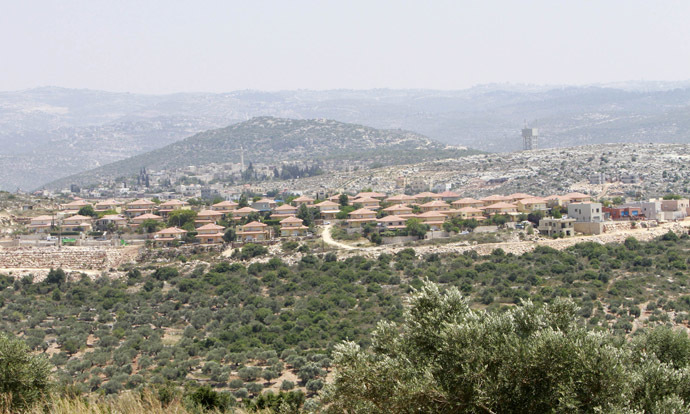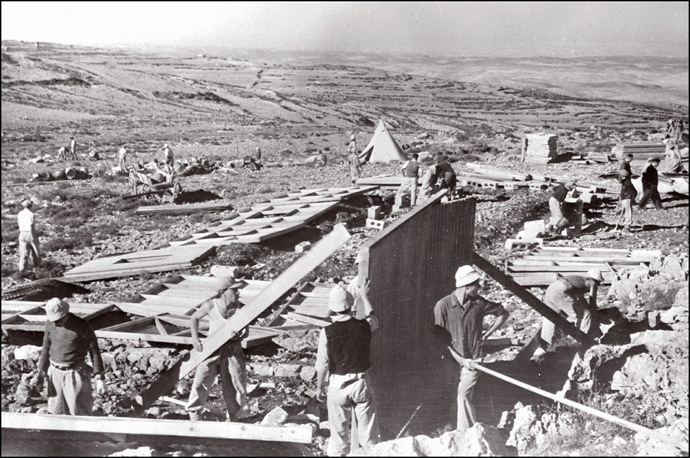Israel & Palestine: A tragedy in three acts

Israel did not arise from the struggle of a settled indigenous people fighting for territorial independence from Western colonial powers as was the case in dozens of nations throughout the Americas, Africa, Levant and Asia over the past two centuries.
Israel is no ordinary state. It’s in a class by itself. Israel was born of the iron will of a small, very close-knit and highly organized ethnic group bent on occupying a specific territory in obedience to ancient religious tradition and highly doubtful historical continuity.
Prologue
Cosmopolitan Ashkenazim and Sephardic Jews combined their leaders’ immense political, financial, media and diplomatic clout to ensure European Jews would, against all odds, get their homeland in Palestine. This entailed ignoring the interests and lives of millions of Palestinians living there for many generations, which for the past eighty years has meant untold suffering and millions of dead, maimed and injured throughout the Middle East; today, it even means risking a new global war.
The fight for a Jewish homeland is rooted in 19th Century movements promoting “Zionism”: the forced emigration of Central European Jews – notably from Russia, Poland, Ukraine and Germany – into Palestine, as well as North and South America.
The undisputed founding father of International Zionism was Viennese lawyer Theodor Herzl who convened the First Zionist Congress in Basel, Switzerland in 1898. His seminal book, Ein Judenstaat (“A Jewish State”) published in 1896 sets out the rationale, method and plan for founding a sovereign Jewish State, discretely leaving the door open for founding not just one but two Jewish states.
Act I: Persecuted European Jews in need of a place to settle
The Time and Place: 19th Century Eastern, Central and Western Europe.
Historically, Christian Europe discriminated against the Jews. For centuries they were second-grade citizens and were systematically expelled from France, Germany, Italy, Spain, Scandinavia, Britain, Portugal, Austria, Hungary, Russia, Belorussia, Poland, Ukraine and many other nations.
Scorned by both Catholics and Protestants, they were segregated inside ghettos from where they focused on retailing and, with time, became Europe’s foremost international bankers.

Resistance against them regularly flared, often into bloody pogroms. Zionist activists took advantage of this state of affairs to rally their flock into their movement. This centuries-long targeting of Jews is called “Anti-Semitism”, and can only be explained in two basic manners:
- Either the majority of Europeans, throughout its vast cultural and national geography and for centuries at a time, suffered a psychological pathology called “Anti-Semitism” which led them to recurrently attack and expel this tiny roaming community from their midst; a mental illness to which the Jews themselves were obviously immune; or
- There exist certain recurrent traits and characteristics of Jewish social behavior that systematically generate rejection by a wide variety of peoples in all of Europe. In such a case, “Anti-Semitism” should be reclassified as an irrational, unwanted and improper defense mechanism. Theodor Herzl himself spelled it out in his foundational book explaining that Anti-Semitism “exists wherever Jews live in perceptible numbers”.
Though “Anti-Semitism” certainly has its religious overtones, its root cause in modern times is not so much religious as it is social. Contrary to Islam and Christianity which many times rose up in Holy War and Crusading to convert the heathen, Judaism never seeks to convert anybody by force.
Quite the contrary: Jews are such by birth; by blood; by genetics. Religious conversion is therefore not an option. In fact, historically there is only one example of conversion en masse to Judaism: the 8th Century Central Asian nomadic tribe of the Khazars who did so in order not to fall under the powerful sway of neither Constantinople’s Christianity nor Baghdad Caliphate’s Islam.
These converted Khazars are the forefathers of modern-day Ashkenazim Jews who slowly made their way into Europe through Poland and Germany. Today, they form Jewry’s elite core in Israel, America and Europe. They do not, however, have any significant blood relationship with the Semitic Israelites and Hebrews of the Old Testament.
Within this backdrop, the Zionist Movement came to life as a Pan-European movement.

Act II: The long, hard road to Jerusalem
The Time and Place: 20th Century Europe and the Middle East
For centuries, Jews would part company with the hope-filled greeting “Next year in Jerusalem”. Gathering in Zion was a leitmotiv of their hope to one day achieving nationhood in the land of Moses, Abraham and David.
Theodor Herzl, Leon Pinsker, Chaim Weizmann, David Ben Gurion and other founding fathers fought to create Israel however at the turn of the 20th Century; the Holy Land was just not an option. When Zionists petitioned Ottoman Turkey’s Sultan who reigned over Palestine to give them their state he simply refused. But they continued lobbying, leveraging and promoting their ideas and ideals, whilst through academia and the press they nurtured increasingly liberal social conditions necessary for them to flourish.
By then, extremely powerful European bankers with deeply embedded contacts and into every government, directly and indirectly consolidated and promoted the Zionist ideal. They used long-term rather than short-term strategies; their names are symbols of the burgeoning international finance over-world: Rothschild, Warburg, Schiff, Lazard, Bleichroeder, Belmont, Hirsch, Montefiore, Goldschmidt, Oppenheimer, Goldman, Sachs, Erlanger, Speyer, Mendelssohn and many other powerful European bankers, brokers and traders who extended their power and influence throughout Europe and the Americas.
German billionaire Maurice Hirsch supported Herzl’s plans founding the Jewish Colonization Association that promoted emigration of Eastern European Jews to America, notably Argentina, a country ranking very high on Zionism’s priority list.
In fact, Herzl’s seminal Ein Judenstaat, includes a key chapter whose title says it all: “Palestine or Argentine?” In it Herzl points out that that “Argentina in one of the most fertile countries in the world, extends over a vast area, has sparse population…” and would “derive considerable profit from the cession of a portion of its territory to us…” for which Zion’s bankers could “assume part of its public debt…” (The Jewish State, Dover, NY, 1988, Page 95).

But then a century ago came World War I, which Germany, Austria and Ottoman Turkey lost in 1918 to France, Britain and the US, leaving Palestine as a British Mandate. The year before, UK Baron Walter Rothschild secured from Britain’s Foreign Secretary Sir Arthur James Balfour a “Declaration” whereby Britain “would favor the establishment in Palestine of a national home for the Jewish people, and will use their best endeavors to facilitate the achievement of this object” subject to nothing being “done which may prejudice the civil and religious rights of existing non-Jewish communities in Palestine.” This triggered a new wave of European Jewish emigration to Palestine.
The 30’s and 40’s, however, brought a new wave of persecution under the Third Reich and World War II, generating in its aftermath renewed support for a Jewish homeland. That was finally achieved in 1948, not so much as recognition of Zionists’ right to impose a Jewish State upon Palestine, but due to unrestricted Western support for the Zionist Plan. Ever since, Israel enjoys a blank check from the West.
Since then, Palestinians have been brutalized and expelled from their homes by terrorist organizations, notably the Irgun Zvai Leumi, which infamously blew up British Military Mandate headquarters in the King David Hotel in Jerusalem in 1946 (led by Menachem Beguin, later Israeli PM and Nobel “Peace” Prize laureate); the Stern Gang (led by Yzakh Shamir who also became PM), which in 1948 assassinated UN Envoy Count Folke Bernadotte in Jerusalem as he tried to negotiate a two-state solution) and the Hagganah. In 1948 these three terror groups merged forming the IDF (Israel Defense Force).
The key question no one dares address in the West is: if European regimes persecuted European Jews in the 30’s and 40’s, why were the Palestinians forced to pay the unbearable price of having their country taken over and all but destroyed?
Act III: Zionism reinvents itself?
The Time and Place: 21st Century, the world.
Former Harvard University Dean Stephen Walt and Chicago University Professor John Mearsheimer in their 2007 book “The Israel Lobby and US Foreign Policy” describe in convincing detail how AIPAC (American Israeli Public Affairs Committee) and other pro-Israel lobbies wield huge media, banking, diplomatic and political power in the United States in Israel’s favor, leading to its having its way time and again.
In recent years, however, something seems to be changing. Global public opinion looks on in horror as Israel commits genocide. Rending their garments to the cries of “Anti-Semitism!” and “Holocaust!” doesn’t hold up anymore. As so often in the past, common people everywhere are once again growing very weary of Jewish behavior.
The writing is on the wall.
Surprisingly, in August 2012 a paper entitled “Preparing For A Post-Israel Middle East” commissioned by the US intelligence community comprising 16 agencies (including Navy, Army, Air Force, Marine Corps, DIA, DEA, FBI, NSA, CIA, Homeland Security and Pentagon), concluded that Israel is currently the greatest threat to US national interests because of its nature and actions preventing normal US relations with Arab and Muslim countries.
Then, in September 18, 2012, Rupert Murdoch’s The New York Post quotes arch-Zionist Henry Kissinger saying ‘word for word’, “In Ten Years there will be no more Israel.” Adding that “Kissinger’s statement is flat and unqualified. He is not saying Israel is in danger, but could be saved if we just gave it additional trillions of dollars and smashed enough of its enemies with our military…. He is not saying that if we bomb Iran, Israel might survive…. He is simply stating a fact: In 2022, Israel will no longer exist”.

Since this short article spans three centuries, it might be poignant to mention what 19th Century insider and 33rd Degree Scottish Rite Mason Albert Pike (a Lieutenant General in the Confederate Army during the American Civil War) is said to have written in an oft-(mis)quoted letter to Italian fellow-Mason Giuseppe Mazzini. He spoke of “three major global conflicts” to be unleashed over the next 150 years in order to “achieve the Masonic panacea of World Government.”
- First, a World War whose primary goal would be to destroy the German, Austrian and Russian royal families, leading to Communism;
- A Second War, pitting Nationalists against Zionists, leading to the erection of a Jewish State in Palestine;
- Lastly, war between “political Zionists” and the Islamic World, sparking a Third World War, finally leading to the world government.
Epilogue
Here then lies a key question: is the fact Israel is totally out of control, a miscalculation, a huge mistake or is it part of a long-term ongoing process with its respective “achievements and transitory goals”?
Israel has cornered itself into a dead-end street; as it stands it is no longer a viable state.
Are Zionists about to accept a change in Israel’s status in exchange some other extremely attractive – even if less historical – far-off “Promised Land” where 70 or 80 percent of Israeli population can be re-settled in utmost comfort, security, wealth and peace?
Is Argentina’s (and Chile’s) Southern Patagonian expanse that Promised Land as founding father Herzl imagined and proposed back in 1896? Is Theodor Herzl’s “Project Palestine or Argentine” about to become “Palestine and Argentine”? Will Palestinian Israel become a huge military nuclear garrison? An impregnable “Fortress Israel” controlling the Middle East?
Patagonia: immense, under populated, and incalculably rich in all natural resources. Patagonia: where since decades, tens of thousands of Israeli youths spend their sabbaticals right after military service.
It’s certainly taboo to even mention this in Argentina, a country defeated by the US/UK Alliance militarily (in the Falkland Islands), and by powerful global mega-bankers pushing it yet again to financial collapse. Thankfully, Chile which shares a strip of Patagonia is far more conscientious.
The statements, views and opinions expressed in this column are solely those of the author and do not necessarily represent those of RT.
The statements, views and opinions expressed in this column are solely those of the author and do not necessarily represent those of RT.













